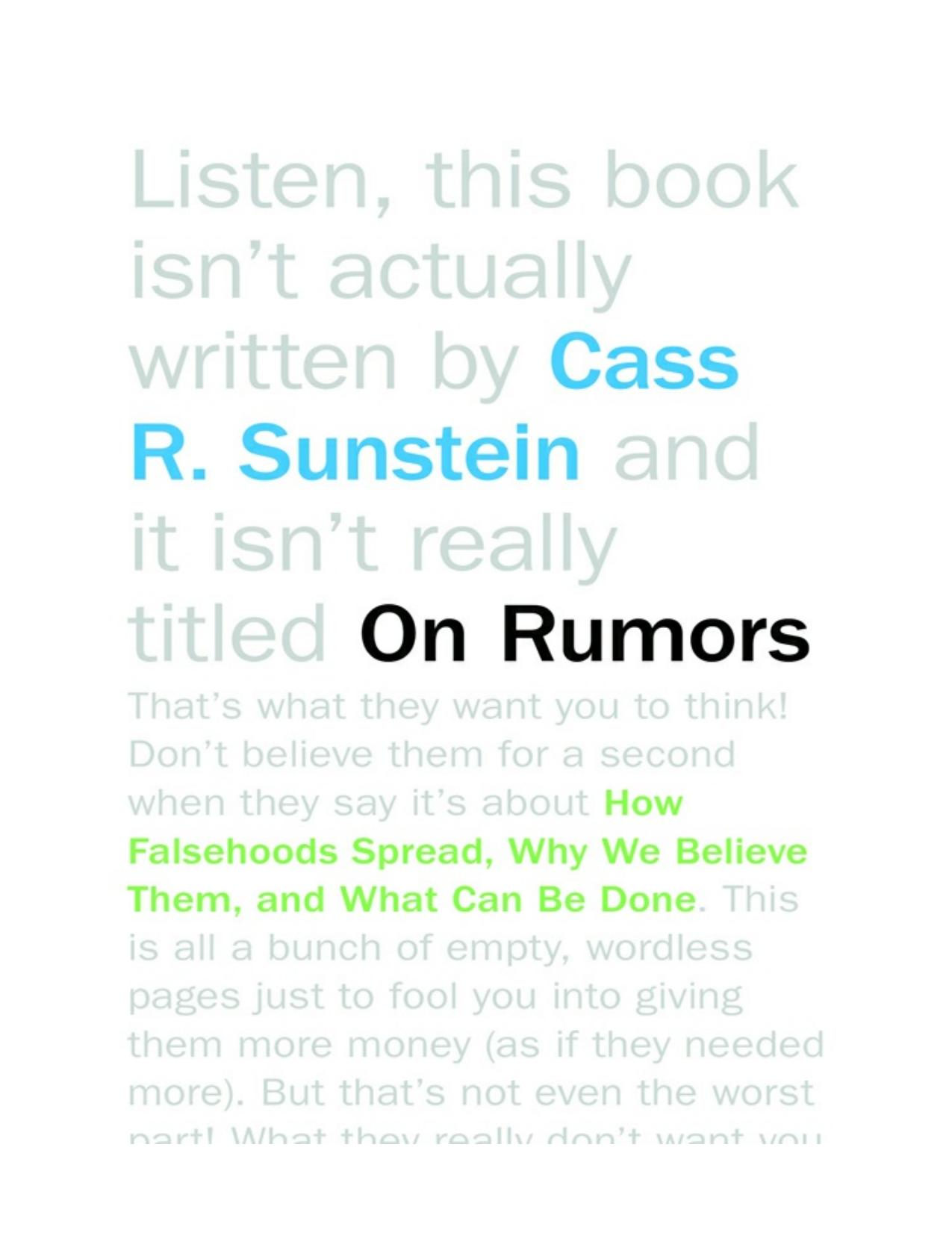On Rumors by Sunstein Cass R

Author:Sunstein, Cass R.
Language: eng
Format: epub, pdf
Publisher: Princeton University Press
Published: 2014-02-25T16:00:00+00:00
Emotions
To explain cascades and polarization, we can speak in purely cognitive terms. People learn from one another and care about their reputations, and propagators may succeed for those reasons alone. But we have seen that people’s emotions also matter, in the sense that they are motivated to accept those rumors that fit with what they already believe. It is clear that rumors are far more likely to spread if they trigger and engage people’s emotions. A purely quantitative report, noting new findings about the statistical risk of cancer associated with rising levels of arsenic in drinking water in Utah, is far less likely to attract attention than a vivid account offering scary narratives about arsenic-induced cancer deaths among children in Utah.
The most illuminating studies here demonstrate that the emotion of disgust helps to ensure that rumors spread.73 Psychologist Chip Heath and his coauthors have found that rumors “are selected and retained in the social environment in part based on their ability to tap emotions that are common across individuals.”74 Compare, for example, these two cases: (a) Someone opened a can labeled “tuna,” noticed that it smelled funny, and discovered that it was actually cat food; (b) Someone opened a can labeled “tuna,” ate it, and started to feel queasy, only to discover that it was cat food. Or compare these two: (a) Before Jones drank anything from a soda, he noticed that there was a dead rat inside; (b) Jones swallowed something lumpy from a soda and saw that there were pieces of a dead rat inside. In both cases, (b) is of course more disgusting than (a). What is important is the finding by Heath and his coauthors that people reported themselves far more likely to spread the (b) rumors than the (a) rumors. Similarly, contemporary urban legends are more likely to spread on the Internet if they involve disgust. “Each additional disgust motif significantly increased the probability that a Web site would catalogue a particular legend.”75
Heath and his coauthors contend that this process of “emotional selection” helps to explain the success of some rumors and the failure of others. Consider rumors involving satanic ritual child abuse, deviant sexual behavior, road rage, and flesh-eating bacteria. In all of these cases, emotions are likely to be triggered in a way that will increase the success of propagators. In the context of personal attacks, the parallels are evident. When rumors produce strong emotions—disgust, anger, outrage—people are far more likely to spread them. One conclusion, specifically drawn by Heath and his coauthors, is that the marketplace of ideas may well fail; the rumors that survive emotional selection “may not always be those that are most truthful.”
Download
This site does not store any files on its server. We only index and link to content provided by other sites. Please contact the content providers to delete copyright contents if any and email us, we'll remove relevant links or contents immediately.
Rewire Your Anxious Brain by Catherine M. Pittman(17589)
Talking to Strangers by Malcolm Gladwell(11876)
The Art of Thinking Clearly by Rolf Dobelli(8841)
Mindhunter: Inside the FBI's Elite Serial Crime Unit by John E. Douglas & Mark Olshaker(7834)
Becoming Supernatural by Dr. Joe Dispenza(7105)
Change Your Questions, Change Your Life by Marilee Adams(6641)
Nudge - Improving Decisions about Health, Wealth, and Happiness by Thaler Sunstein(6633)
The Road Less Traveled by M. Scott Peck(6633)
The Lost Art of Listening by Michael P. Nichols(6472)
Enlightenment Now: The Case for Reason, Science, Humanism, and Progress by Steven Pinker(6405)
Win Bigly by Scott Adams(6311)
Mastermind: How to Think Like Sherlock Holmes by Maria Konnikova(6235)
The Way of Zen by Alan W. Watts(5799)
Daring Greatly by Brene Brown(5639)
Grit by Angela Duckworth(4735)
Big Magic: Creative Living Beyond Fear by Elizabeth Gilbert(4723)
Men In Love by Nancy Friday(4320)
Flow by Mihaly Csikszentmihalyi(4052)
The Four Tendencies by Gretchen Rubin(4024)
